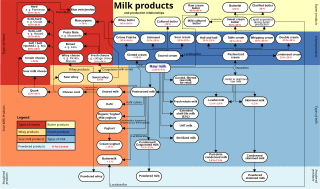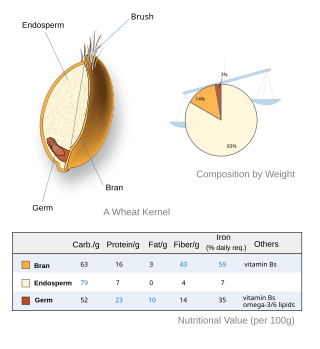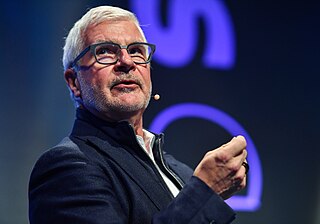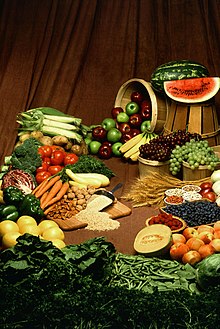
Dairy products or milk products, also known as lacticinia, are food products made from milk. The most common dairy animals are cow, water buffalo, nanny goat, and ewe. Dairy products include common grocery store food around the world such as yogurt, cheese, milk and butter. A facility that produces dairy products is known as a dairy. Dairy products are consumed worldwide to varying degrees. Some people avoid some or all dairy products because of lactose intolerance, veganism, or other health reasons or beliefs.

Joel Fuhrman is an American celebrity doctor who advocates a plant-based diet termed the "nutritarian" diet which emphasizes nutrient-dense foods. His practice is based on his nutrition-based approach to obesity and chronic disease, as well as promoting his products and books. He has written books promoting his dietary approaches including the bestsellers Eat to Live, Super Immunity, The Eat to Live Cookbook, The End of Dieting (2016) and The End of Heart Disease (2016). He sells a related line of nutrition-related products.

The Paleolithic diet, Paleo diet, caveman diet, or stone-age diet is a modern fad diet consisting of foods thought by its proponents to mirror those eaten by humans during the Paleolithic era.

A fad diet is a diet that is popular, generally only for a short time, similar to fads in fashion, without being a standard scientific dietary recommendation, and often making unreasonable claims for fast weight loss or health improvements; as such it is often considered a type of pseudoscientific diet. Fad diets are usually not supported by clinical research and their health recommendations are not peer-reviewed, thus they often make unsubstantiated statements about health and disease.

Low-carbohydrate diets restrict carbohydrate consumption relative to the average diet. Foods high in carbohydrates are limited, and replaced with foods containing a higher percentage of fat and protein, as well as low carbohydrate foods.

The Mediterranean diet is a diet inspired by the eating habits and traditional food typical of southern Spain, southern Italy, and Crete, and formulated in the early 1960s. It is distinct from Mediterranean cuisine, which covers the actual cuisines of the Mediterranean countries. While inspired by a specific time and place, the "Mediterranean diet" was later refined based on the results of multiple scientific studies.

Raw foodism, also known as rawism or a raw food diet, is the dietary practice of eating only or mostly food that is uncooked and unprocessed. Depending on the philosophy, or type of lifestyle and results desired, raw food diets may include a selection of fruits, vegetables, nuts, seeds, eggs, fish, meat, and dairy products. The diet may also include simply processed foods, such as various types of sprouted seeds, cheese, and fermented foods such as yogurts, kefir, kombucha, or sauerkraut, but generally not foods that have been pasteurized, homogenized, or produced with the use of synthetic pesticides, fertilizers, solvents, and food additives.

A gluten-free diet (GFD) is a nutritional plan that strictly excludes gluten, which is a mixture of prolamin proteins found in wheat, as well as barley, rye, and oats. The inclusion of oats in a gluten-free diet remains controversial, and may depend on the oat cultivar and the frequent cross-contamination with other gluten-containing cereals.

A plant-based diet is a diet consisting mostly or entirely of plant-based foods. Plant-based diets encompass a wide range of dietary patterns that contain low amounts of animal products and high amounts of fiber-rich plant products such as vegetables, fruits, whole grains, legumes, nuts and seeds. They do not need to be vegan or vegetarian but are defined in terms of low frequency of animal food consumption.

A healthy diet is a diet that maintains or improves overall health. A healthy diet provides the body with essential nutrition: fluid, macronutrients such as protein, micronutrients such as vitamins, and adequate fibre and food energy.

A whole grain is a grain of any cereal and pseudocereal that contains the endosperm, germ, and bran, in contrast to refined grains, which retain only the endosperm.

Dean Michael Ornish is an American physician and researcher. He is the president and founder of the nonprofit Preventive Medicine Research Institute in Sausalito, California, and a Clinical Professor of Medicine at the University of California, San Francisco. The author of Dr. Dean Ornish's Program for Reversing Heart Disease,Eat More, Weigh Less and The Spectrum, he is an advocate for using diet and lifestyle changes to treat and prevent heart disease.

Mark Adam Hyman is an American physician and author. He is the founder and medical director of The UltraWellness Center and was a columnist for The Huffington Post. Hyman was a regular contributor to the Katie Couric Show until the show's cancellation in 2013. He writes a blog called The Doctor’s Farmacy, which examines many topics related to human health and welfare. He is the author of several books on nutrition and longevity, including Food Fix, Eat Fat, Get Thin, and Young Forever.

Ruby Alice Tandoh is a British baker, columnist, author, and former model. She was runner-up on series four of BBC's The Great British Bake Off in 2013 and has written four cookbooks. Her 2021 Cook as You Are was named to several best-of lists. Her online debates with many in the UK food world have also drawn attention.
Eleanor Laura Davan Mills is a British food writer and businesswoman, best known for the plant-based 'Deliciously Ella' food blog and brand. On her mother's side she is part of the Sainsbury family.

Steven R. Gundry is an American physician and low-carbohydrate diet author. He is a former cardiac surgeon and cardiac surgery researcher who runs an experimental clinic investigating the impact of diet on health. Gundry is the author of The Plant Paradox: The Hidden Dangers in "Healthy" Foods That Cause Disease and Weight Gain, which promotes the controversial lectin-free diet.
Jasmine and Melissa Hemsley are English food writers and media personalities who have been closely associated with the clean eating and "wellness" movement. Their first book, The Art of Eating Well (2014) spawned a television series on Britain's Channel 4 titled Eating Well with Hemsley + Hemsley.

Soul food is a kind of African American cuisine that encompasses a variety of fried, roasted, and boiled food dishes consisting of chicken and pork meats, sweet potatoes, corn, leafy greens and other vegetables. Soul food has long been embedded in African American culture, but pushes towards healthy eating habits, for both physical and mental health, have adapted soul food cuisine to fit within health trends. This article will describe modifications of traditional soul food within health trends, including soul food with low carb, soul food with low sugar, soul food with low fat, soul food for vegan and soul food in gluten-free.

The Lectin-free diet is a fad diet promoted with the false claim that avoiding all foods that contain high amounts of lectins will prevent and cure disease.

















